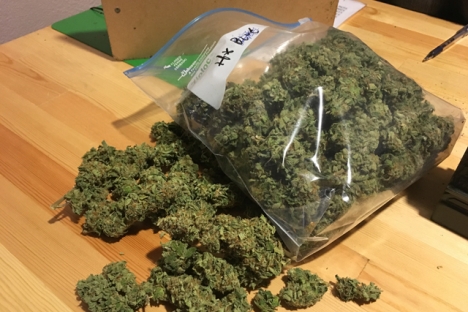City looks to nip marijuana operations in the bud
Despite the marijuana-loving reputation of the citizens of Nelson, the City of Nelson itself is taking a stance against the proliferation of illegal marijuana operations.
City council passed the first two readings of amendments to a bylaw Monday night at its regular meeting which, once adopted, would effectively prohibit any marijuana operation in all land use zones throughout the city.
Under the draft bylaw, a marijuana operation is defined as a means for the cultivating, growing, producing, packaging, storing, distributing, dispensing, advertising, trading or selling of cannabis (marijuana) or its derivatives.
Mayor Deb Kozak said city council has been monitoring the situation of the appearance of marijuana operations in the city for the past year with the intent of working closely with the federal government to regulate.
“This bylaw is the first step in specifying how and where dispensaries will operate,” she said.
A federal government task force is expected to design a new system of marijuana sales and distribution with appropriate federal and provincial excise taxes applied in the coming year.
“(We are) preparing for new regulations,” said Coun. Michael Dailly, with the draft bylaw’s “impetus is the outlets popping up without regulations.”
If adopted, the proposed amendments would strengthen the city’s ability to enforce its own bylaws, Kozak said.
Although the zoning bylaw would not allow dispensaries anywhere in Nelson, said Dailly, the city does “not plan to enforce unless necessary.”
The bylaw amendments would also ensure that any new marijuana storefronts that open after the amendments have been adopted would be non-conforming on the basis of their use, and they would not receive any protection as legally non-conforming uses under the Local Government Act.
“The existing outlets do not have business licences now, now they will also be illegally zoned,” said Dailly.
There are currently seven marijuana dispensaries in the city, with three located in the downtown core (Baker Street, Vernon Street and Victoria Street). Under the Controlled Drugs and Substances Act a person cannot possess a schedule two substance like cannabis without specific authorization.
“Despite the fact that several of these storefront operations have opened in recent months, they are operating contrary to criminal law — they are illegal,” read a city staff report to council.
A public hearing will now need to be held — under Section 465 of the Local Government Act — for the purpose of allowing the public to make presentations respecting matters contained in the proposed bylaw before the bylaw travels any further. The public hearing date and time have not been set.
Although the federal government is expected to introduce legislation for marijuana in spring 2017, local governments are left to address illegal marijuana procession and sales in accordance with current federal law.
If a business does not comply with all applicable regulatory requirements — including provincial and federal regulations — this means in accordance with Business License Bylaw 3328, 2016, the city possesses the ability to refuse issuance of business licenses to marijuana dispensaries.
Last month the city was asked to lead a discussion panel on the local effect of marijuana legalization at the Union of B.C. Municipalities convention. Kozak and city council have vocally called for the integration of federal marijuana legislation with regional and local regulation.
“What we are looking for is the federal government to work in tandem with provincial and local governments in formulating laws so that we have a say on what goes on in our communities,” she said.
“Anything decided at the federal level will have impact at the local level. Once it is regulated how do local communities deal with the product, and all that comes with it.”
Council has also called for its fair share of the revenue from the sale and distribution of legalized marijuana, in addition to a sharing of the reduced enforcement costs with provincial and municipal governments, “given the marked impact that marijuana sales and distribution will have upon Canadian communities.”

























